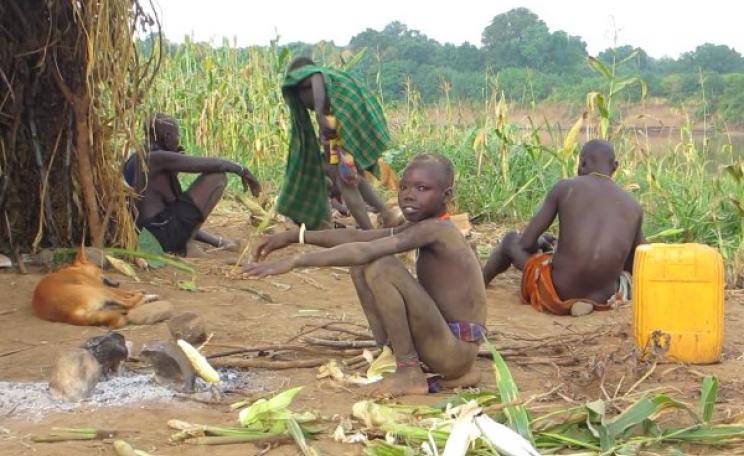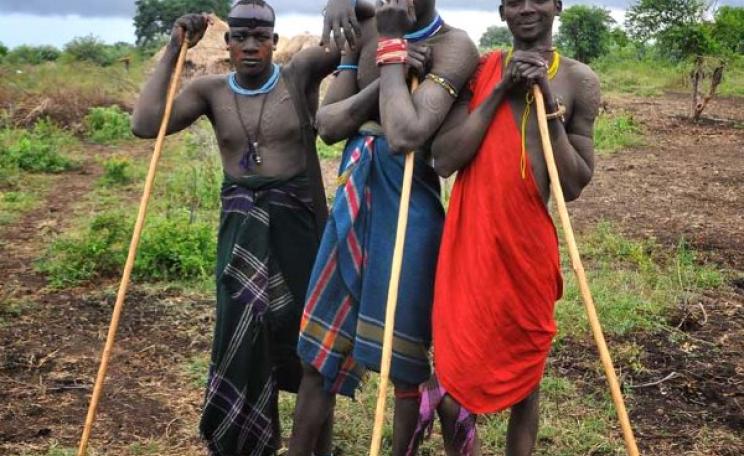We are waiting to die ... When the government collects people into one village there will be no place for crops, and my children will be hungry and have no food.
The tribes of Ethiopia's Lower Omo Valley are being violently evicted from their villages by the government to make way for lucrative cotton, palm oil, and sugarcane plantations whose irrigation will be made possible by the controversial Gibe III dam.
Transferred to designated resettlement areas, the once self-sufficient tribes will be left with no access to their livestock or lands and, consequently, will be unable to sustain themselves.
Violence and intimidation
Intimidation tactics, such as rape and beatings, have reportedly been used against those who resist resettlement. One Mursi man told Survival International, which is campaigning on the issue:
"We are waiting to die. We are crying. When the government collects people into one village there will be no place for crops, and my children will be hungry and have no food."
The Ethiopian government has not consulted any indigenous communities over its aggressive plantation plans in the Omo Valley, and very few were consulted over the construction of the Gibe III dam.
The region's top human rights body, the African Commission on Human and Peoples' Rights, has written to the Ethiopian government asking it to halt the forced resettlement of the Lower Omo tribes while it investigates Survival's submission regarding human rights violations in the area.
Yet the aid keeps on rolling in
Ethiopia is one of the biggest recipients of American and British aid through the United States Agency for International Development (USAID) and the UK Department for International Development (DFID).
In a letter to Survival, USAID stated: "USAID and other donors have been monitoring the situation in South Omo where the Bodi, Mursi and Kwegu peoples live ...
"The main finding from these trips is that there are no reports of widespread or systematic human rights abuses. Our observations do not support assertions described in your letter that the resettlement processes are accompanied by widespread and systematic human rights abuses."
Defence of human rights in Ethiopia is now US Law
Among the provisions of the Omnibus Appropriations Act for 2014 are specific measures applying to the South Omo region:
"Funds appropriated by this Act under the headings 'Development Assistance' and 'Economic Support Fund' that are available for assistance in the lower Omo and Gambella regions of Ethiopia shall:
(A) not be used to support activities that directly or indirectly involve forced evictions;
(B) support initiatives of local communities to improve their livelihoods; and
(C) be subject to prior consultation with affected populations."
A 'slap in the face' for USAID
The provisions represent a "slap in the face for USAID", said Survival International Director Stephen Corry.
"This bill is a huge step in the right direction, and shows that USAID's shameful denials of the human rights abuses being committed in the Lower Omo simply haven't been believed.
"American taxpayers want to be sure that their money isn't going toward the destruction of tribal peoples' lives. Hopefully the historic provisions in this year's spending bill will ensure that's the case."
Although the provisions in the recent spending bill will force USAID to reevaluate the funding given to Ethiopia, it will ultimately be the responsibility of Congress to guarantee that the terms are upheld.
What about the UK?
But Corry remains concerned about UK aid funds to Ethiopia. "It is now high time that British parliamentarians follow suit and ensure that DFID does not use UK taxpayers' money to fund human rights violations in the Lower Omo."







